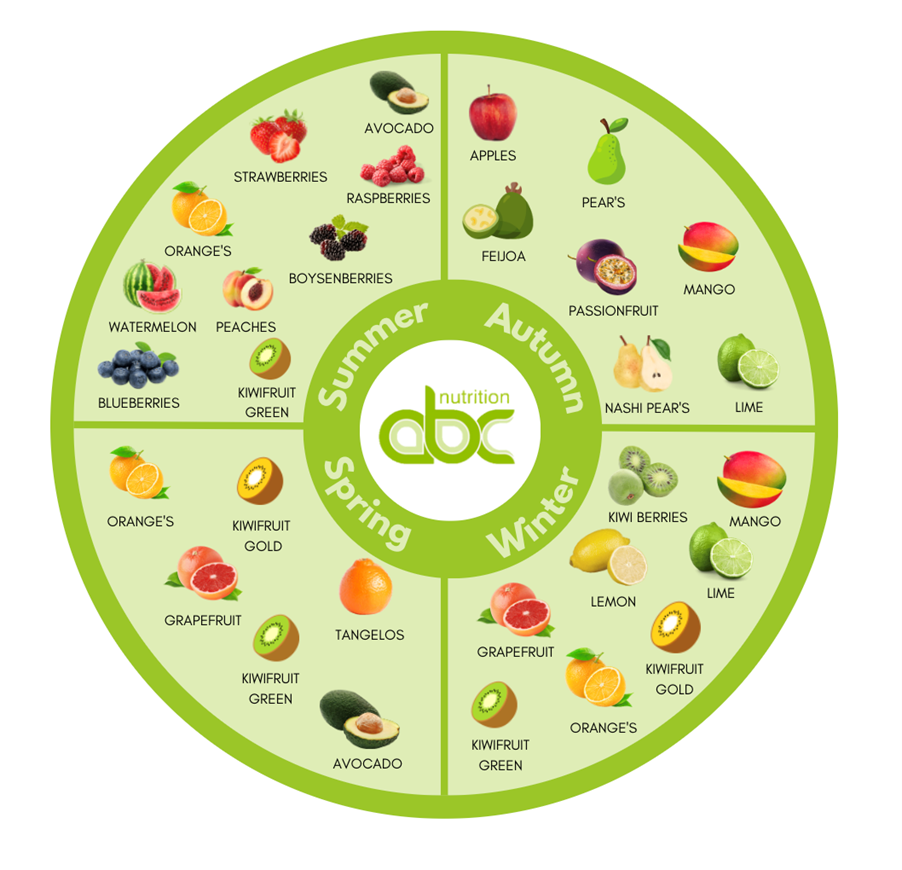Why you should buy fruit and vege in season
There is nothing better than a fridge packed with fruits and vegetables, but as we move into the winter months, for many, this can present challenges. The days are shorter and colder, and the price of our favourite fruits and vegetables is on the rise…
Fortunately, there are ways in which we can make the most of the changing seasons. By eating seasonal produce, we can increase the diversity of our diets, save money, support locals, enjoy flavourful produce, and even support our environment! Here are our top tips on making the most of produce in season and why.
Why are fruits and vegetables important?
Fruits and vegetables provide an array of nutrients that support our health and wellbeing. They contain fibre, vitamins, minerals, and phytonutrients which help us feel energised, support the function of our immune system, and support our health and wellbeing. Eating plenty of fruits and vegetables in the long term has even been associated with a reduced risk of some cancers, heart disease, stroke, and digestive issues.
The NZ Ministry of Health recommends 7+ servings a day—two servings of fruit and five + servings of vegetables.
Why should we buy in season?
Eating fruits and vegetables in season provide us with more nutrients!
Fresh fruits and vegetables are packed with more nutrients when bought in-season than those bought out of season. When fruits and vegetables are harvested, they undergo the process of respiration and transpiration, where nutrients in the food begin to break down, and water is lost.
While fruits and vegetables undergo respiration and transpiration throughout all stages of their life, when harvested, they are separated from their source of nutrients and can no longer replenish their nutrient losses.
When you buy in season, there is a shorter duration between harvesting and when fruits and vegetables end up on our plates, resulting in a more minor loss of nutrients.
Purchasing fruits and vegetables in season may provide us with more nutrients than if we were to spend more money on buying produce that is not in season!
Buying in-season saves money
Purchasing fruits and vegetables in season is cheaper than purchasing those not in season. When fruits and vegetables are not in season, they are sought internationally and must travel via plane or cargo ship to reach their destination. The additional cost of importing produce contributes to the increased price of fruits and vegetables that are not in season.
The supply of in-season produce is also commonly higher than those not in season, meaning we also see more reasonable prices due to the abundance of fresh in-season fruits and vegetables.
In-season fruit and vege taste better!
Not only are in-season fruits and vegetables cheaper than off-season produce, but they are also tastier! Fruits and vegetables eaten closer to harvesting are commonly packed with more flavour!
It’s better for the environment
Buying fruits and vegetables in season supports our environment! Produce that is imported undergoes a long transportation process which requires large amounts of fuel and emits greenhouse gases into our atmosphere, causing harm to our environment. Purchasing in season means you are not only buying produce at a reasonable price but also reducing your carbon footprint!
TIP When purchasing your food, think about how many #foodmiles your food has taken before reaching your home. For example, a pineapple from the Philippines has had to travel more than 8,000kms to reach New Zealand!
Buying in season supports locals
Produce that is bought in season is sourced from New Zealand, meaning that when you buy in season, you are also supporting local New Zealanders!
You can also support locals by heading into your local farmers' market or fruit and veggie store!
Tips for getting the most out of your seasonal produce:
Limit cooking time
When fruits and vegetables are exposed to heat and water, they can lose some of the more unstable nutrients. Minimising the time spent cooking fruits and vegetables may improve their nutrient density. However, while cooking can reduce the levels of some nutrients, it can increase the levels of others, such as lycopene, in tomatoes.
Store in water
If your fruits and vegetables are starting to look a little sad… add them to water. Fruits and vegetables are made up of ~ 70-90% water. Therefore, you can extend the shelf life of some of your fruits and vegetables by adding them to water and putting them in the fridge before eating them.
For example, soak spinach or droopy vegetables (as long as there is no visual spoilage of the produce) in water for an hour, pat dry and enjoy!
Freeze your own
If you know that your fruits and vegetables will not be eaten in time, freeze them for later use!
For example:
Freeze bananas and use them in smoothies.
Blend kale and spinach with water, freeze in ice cubes and add to smoothies or curries.
Freeze the juice of citrus fruits in ice cubes. These can be added to water or homemade drinks.
Canned or frozen count
Don't be afraid to buy frozen or canned fruits and vegetables when the fresh counterparts are out of season or more expensive. It is a common misconception that frozen and canned vegetables provide us with fewer nutrients than fresh.
Frozen and canned produce is usually harvested at peak ripeness and processed immediately after. This limits the breakdown of nutrients, especially when compared to fruit and vegetables that have passed peak ripeness, as can happen when stored for too long in the back of our fridge or shelves.
Utilising frozen and canned fruits and vegetables is an excellent way to bulk up meals during the winter months or when your favourite fruit or vegetables are out of season
Use canned tomatoes rather than fresh ones.
Used frozen peas and corn rather than fresh.
Use frozen stir fry mixes to bulk up curries and stir-fries with more vegetables.
Did you know that using frozen food reduces household food waste by up to 47% compared to fresh produce! (reference one)
What’s In Season?
Availability of NZ Vegetables
Availability of NZ fruit
Seasonal Meal ideas
Autumn meal ideas
Roast
Roast your choice of protein with your favourite autumn vegetables and serve with mashed potatoes/kumara and gravy.
Curry
Incorporate autumn vegetables into a curry dish to bulk it up and pack your meal with nutrients!
Green Beans
Stir-fry green beans with your choice of seasoning, serve with salt and enjoy as a side dish.
Winter
Roast Vegetable Salad
Cut your favourite winter veggies into small cubes and season with your favourite herbs and spices. Roast vegetables until slightly firm and combine with your choice of protein.
Tip: Roast walnuts for a few minutes at the end and sprinkle them on top of your salad for extra flavour, texture, and healthy fats!
Spag Bowl
Incorporate more vegetables into your traditional spaghetti bolognaise by grating in-season produce and mixing it in with your mince and tomatoes.
Winter soup
Roast your favourite winter veggies with your favourite herbs and spices. Blend in a food processor with coconut milk or reduced salt stock to make a delicious soup that will keep you warm during cold winter nights!
Spring
Asparagus
Roast asparagus with lemon and garlic and add a choice of protein and a grain such as quinoa or brown rice.
Pasta Salad
Combine fresh spring vegetables and your choice of protein with pasta and a light lemon dressing to make the perfect spring salad!
Guacamole
Combine avocado with tomato, red onion, a splash of lime, and a sprinkle of salt & pepper. Serve with cut-up vegetable sticks, salad, or corn chips.
Summer
Salad
Combine summer vegetables (and fruits) into a bowl with your choice of grains, protein, and dressing to serve the perfect summer salad.
BBQ
Grill some of your favourite summer veggies on the BBQ and serve with your choice of BBQ'd protein such as prawns, chicken, fish, or beef.
Vegetable Fritters
Combine your favourite vegetables such as corn, peas, courgette, and capsicum into a fritter mixture. Serve with avocado (or guacamole) and a sweet chilli dressing.






